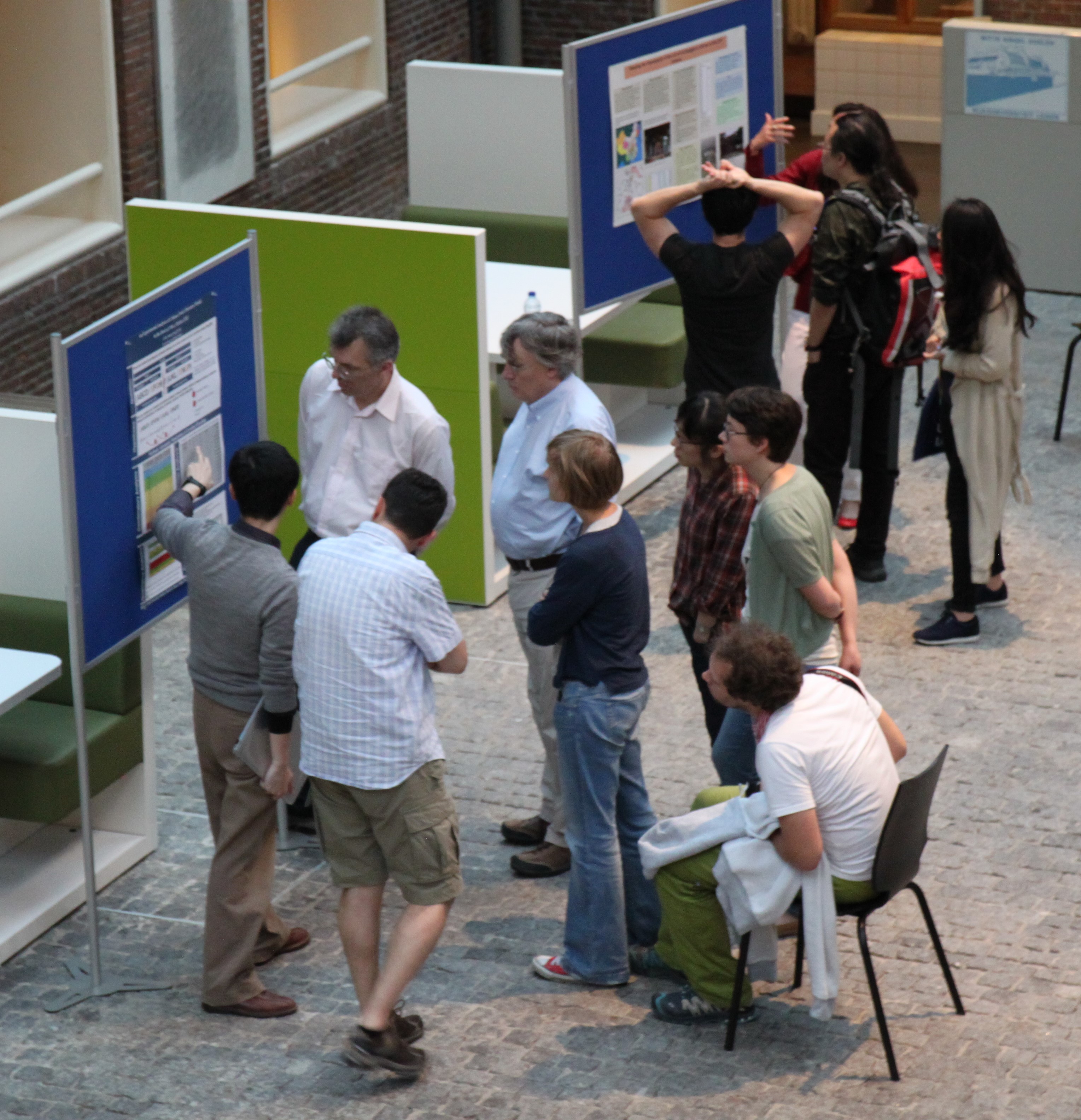Report on the Summer School in Chinese Digital Humanities
The first Summer School in Chinese Digital Humanities (hereafter the Summer School) was held at Leiden University from July 6th to 9th, 2016. Twelve instructors offered a series of workshop sessions to about thirty participants from fifteen countries working on the Chinese humanities.
During the daytime sessions, participants were introduced to various digital methods and practiced these hands-on. The sessions covered source selection and data management, text and image markup, text analysis and comparison, database design, quantitative analysis, spatial analysis, network analysis and other kinds of data visualization. The sessions also entailed other issues relevant to the design of digital research projects such as copyright, funding, and data sharing.
Every evening there were poster presentations in which eight to ten participants presented their research projects. The posters described key questions and sources, and outlined proposed digital methods. They could thus serve as an entry point for face-to-face conversations among participants and instructors. This mode of interaction turned out to be very fruitful and enjoyable.
Sessions
Christian Wittern, Professor at the Center for Informatics in East-Asian Studies, the Institute for Research in Humanities, Kyoto University, kicked off the Summer School with an introduction to textual markup, focused on the application of the Text Encoding Initiative (TEI) standard to the markup of texts and images. Participants used oXygen to practice textual and image markup. The next session on data management was presented by Fieke Schoots and Michelle van den Berk, Subject Librarians at the Leiden University Library. They discussed data organization the storage of ongoing projects, and the maintainance and sharing of completed projects. Schoots and van den Berk pointed out that it is crucial to consider data preservation from a long-term perspective because funders and publishers are increasingly implementing open access policies for facilitating academic verifiability. Anke Klerkx, Director of the Grant Development Team at the Knowledge Exchange Office at Leiden University and Leiden University Medical Center, concluded the first day with a session on the different grant opportunities available to DH researchers. In this session participants also discussed how applicants can ensure that they meet the guidelines of particular grant schemes.
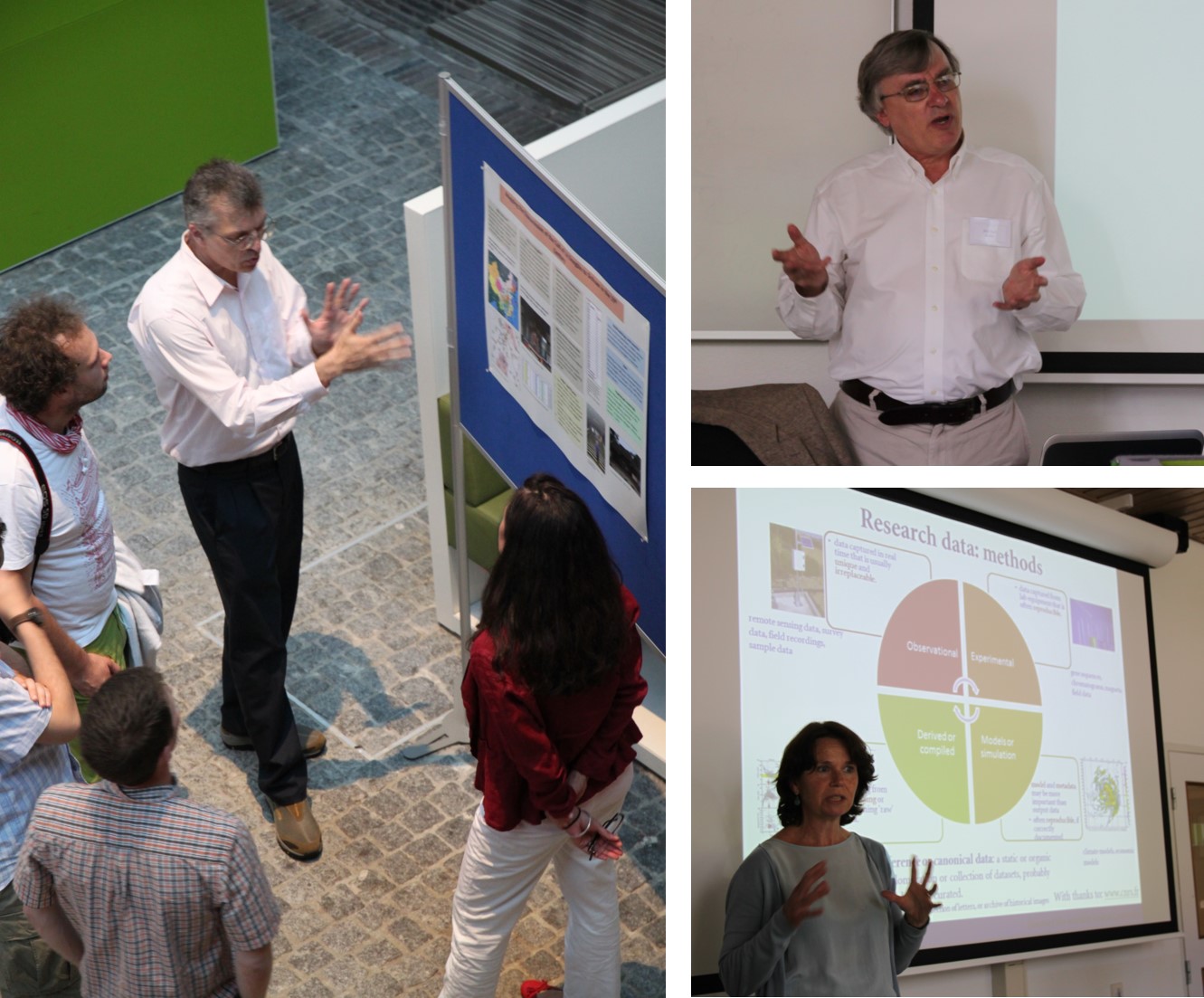
Day 2 focused on different means of data extraction and text comparison which allow
researchers to move beyond conventional reading methods and generate new
interpretations. Instructors also reminded participants that when comparing data,
researchers should first consider whether the statistics were produced according to
comparable standards, similar scales of sampling pool, for example, to prevent
misinterpretation. Chao-Lin Liu, Distinguished Professor at the Department of Computer
Science, National Chengchi University, introduced TaiwanDH, an
evolving set of software tools, which can generate statistics for the analysis of term
frequency and term co-occurrences. He also discussed the pros and cons of different word
segmentation tools. Paul Vierthaler, Digital Humanities Postdoctoral Fellow and Visiting
Assistant Professor of History Department, Boston College, demonstrated how to use
stylometric analysis to investigate stylistic relationships in a corpus of Chinese
texts. Vierthaler also showed participants how to conduct hierarchical cluster analysis
and principal component analysis using Python scripts. For the
final session of the day, Database Design & Quantitative Analysis, Michael Fuller,
Professor at the Department of East Asian Languages & Literature, University of
California, Irvine and also the lead designer of Chinese Biographical Database (CBDB),
revealed the logic and magic of relational databases (RDB), using CBDB as an example.
Fuller provided a hands-on introduction to RDB design, and also demonstrated the
powerful functions of the Microsoft Access version of CBDB for prosopographical
research.
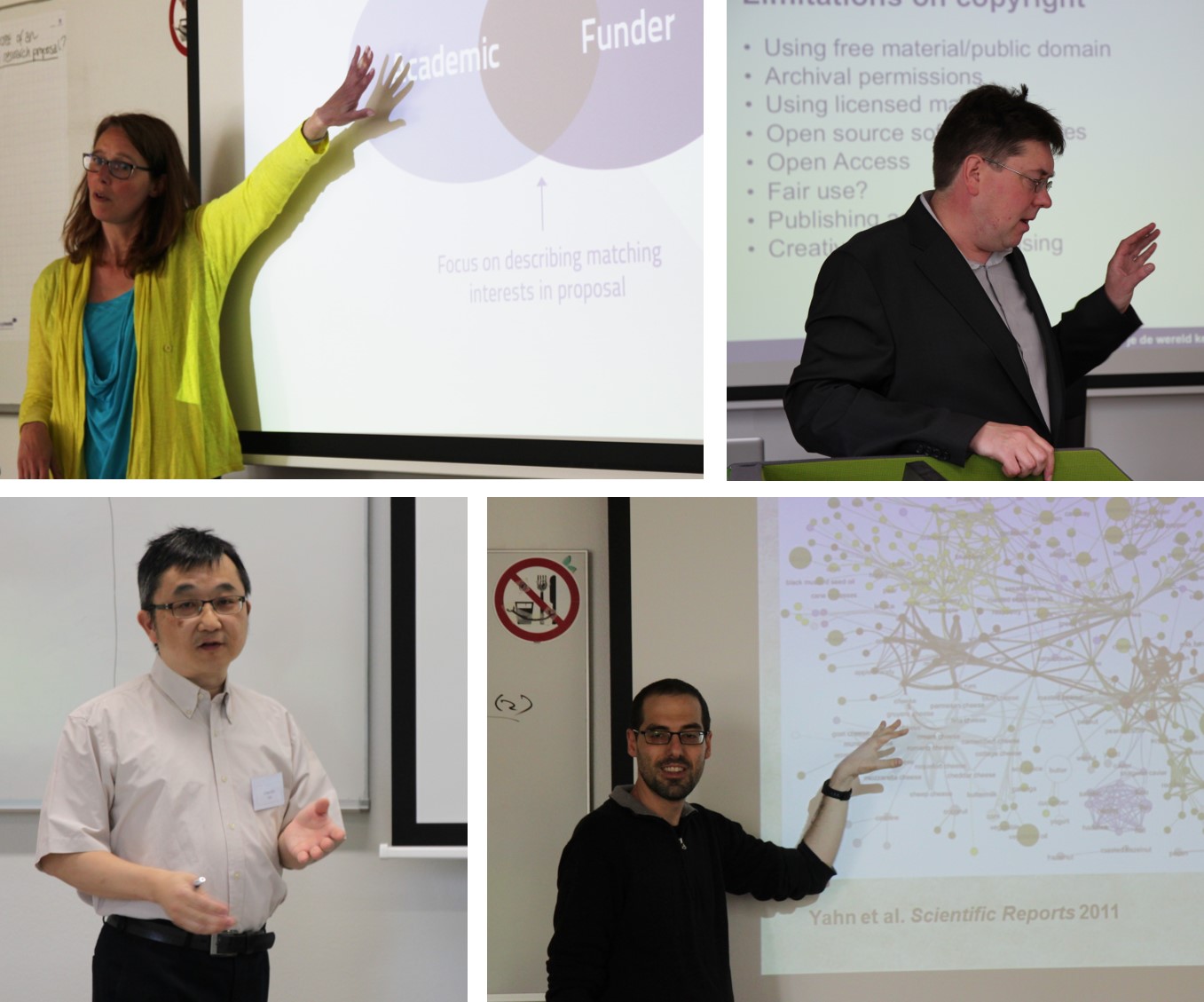
Day 3 and Day 4 focused on data visualization. Participants learned how data
generated through text mining or gathered in databases can be explored and analyzed on
the basis of visualizations that allow for pattern detection. Chu Ping-Tzu, Associate
Professor at the Department of Chinese Literature, National Tsing Hua University,
introduced spatial analysis by means of Excel2Earth, a tool developed by
Chih-Sung Teng, Associate Professor, the Graduate Institute of National Development,
National Taiwan University. Excel2Earth maps Excel spreadsheets onto Google Earth. Allon Wagner, data analyst at
the Department of Archaeology and Ancient Near Eastern Cultures, Tel-Aviv University,
explained that visual thinking is a prerequisite for social network analysis (SNA). SNA
encompasses a set of methods to analyze society by representing actors and interactions
among them in networked structures and structures in graphs. This perspective also
allows researchers to more accurately measure centrality in social configurations by
different standards.
On Day 4, Hilde De Weerdt, Professor at the Leiden University Institute for Area
Studies, Leiden University, and Brent Ho, Communication and Empire Project Research
Associate, Leiden University, demonstrated the use of MARKUS, an online platform for Chinese
text markup and visualization. De Weerdt demonstrated how users can automatically link
tagged content to data from Chinese
Biographical Database and visualize and explore this content in VISUS, the
associated visualization interface. VISUS links to Stanford’s Humanities and Design
Research Lab’s Palladio platform, the
MPI’s Platin map platform. She further
provided examples of how one can use these methods to read texts in new ways and
generate hypotheses about the data. Day 4 ended with a session on data sharing and legal
questions. Damiaan van Eeten, Subject Librarian at the Leiden University Library, led a
lively discussion on Copyright Law and Open Access, explaining the regulations of
Intellectual Property Rights and Data Protection Law under European Union Law on the
basis of a rich variety of cases. Regulations in Europe, North America and China, differ
significantly. This can cause confusion about which rules apply but also provides
opportunities to scholars. There was also a discussion on how to ensure various kinds of
contributors receive credit when DH resources are used in research.
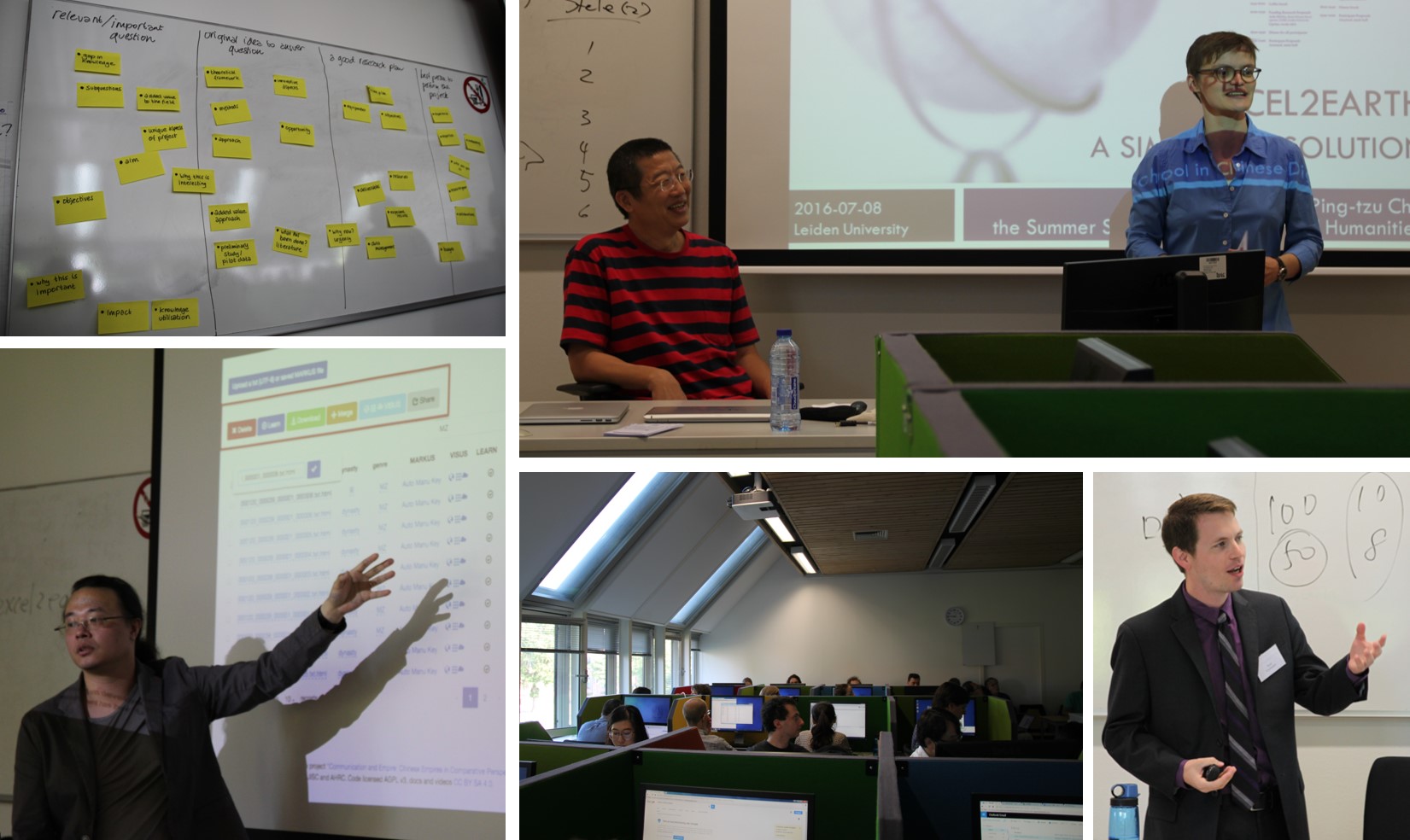
Poster Presentations
Thirty participants selected from over ninety applicants took turns to present their research projects during three evening sessions. Participants worked in diverse disciplines including linguistics, philosophy, history and literature. The period covered ranged from 4th to 20th century China while the geographical scales varied from large regions, such as the Mongolian Eurasian Empire, to specific cities, such as 19th-century Tianjin.
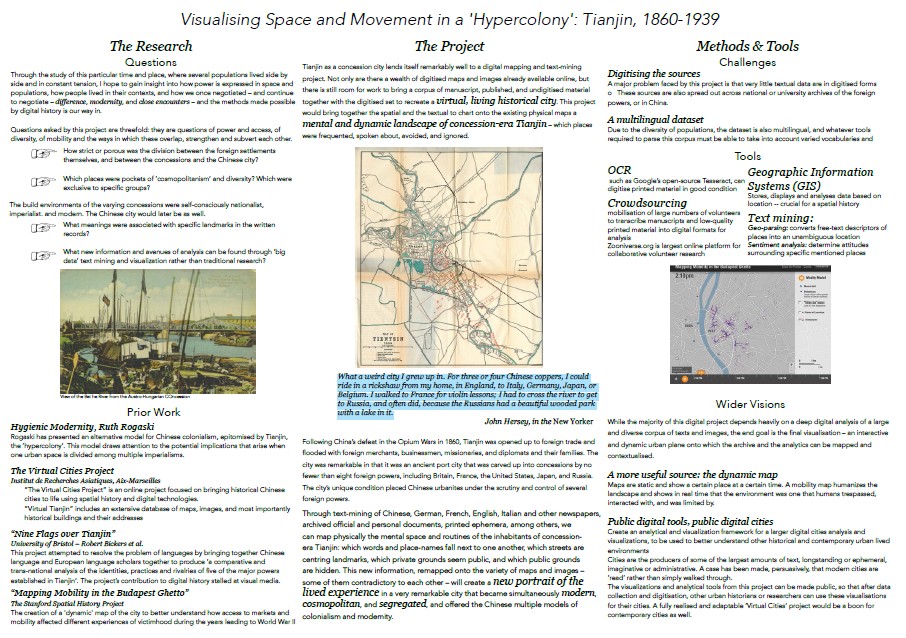
*Poster by Julie Yue, School of Oriental and African Studies, University of London, UK
Topics included Qing China’s negotiation with foreign forces on issues of foreign settlement, law or the concept of “state”, the social networks of the modern literary communities, the textual analysis of Chinese Christian texts, and the transmission of popular religious deities in early modern China. Several historical projects probed into the connection between marital relationships and power transfer or focused on how and through what kinds of networks information was disseminated. Posters in linguistics and philosophy dealt with the distribution of ideophones, poetry networks, and discursive changes in Chinese intellectual history. Posters described key questions, sources, and methods of interest; they can all be viewed on our workshop page by clicking on the presenters' names.
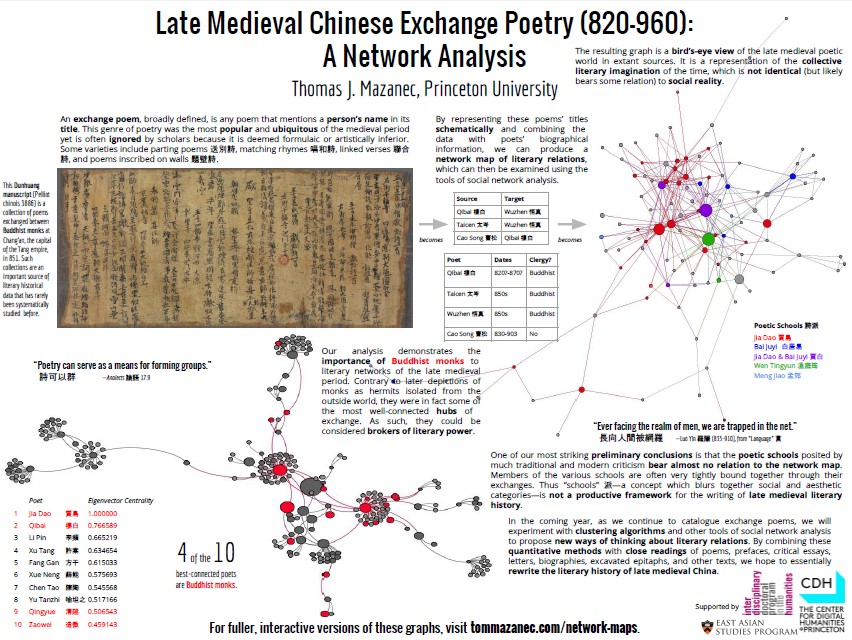
* Poster by Thomas Mazanec, East Asian Studies Department, Princeton University, US
Feedback & Prospects
The Summer School was the first of its kind. It demonstrated the significant work that has been undertaken in recent years to create digital resources and tools relevant to Chinese Studies. It also established a foundation for the creation of a scholarly network for those interested in digital scholarship. In the final discussion there was a strong interest among participants to continue the Summer School in the future. A proposal to develop hands-on sessions based on data used in each participant’s ongoing project received the most enthusiastic support. Others suggested that a series of modules could be developed from beginner to advanced levels.
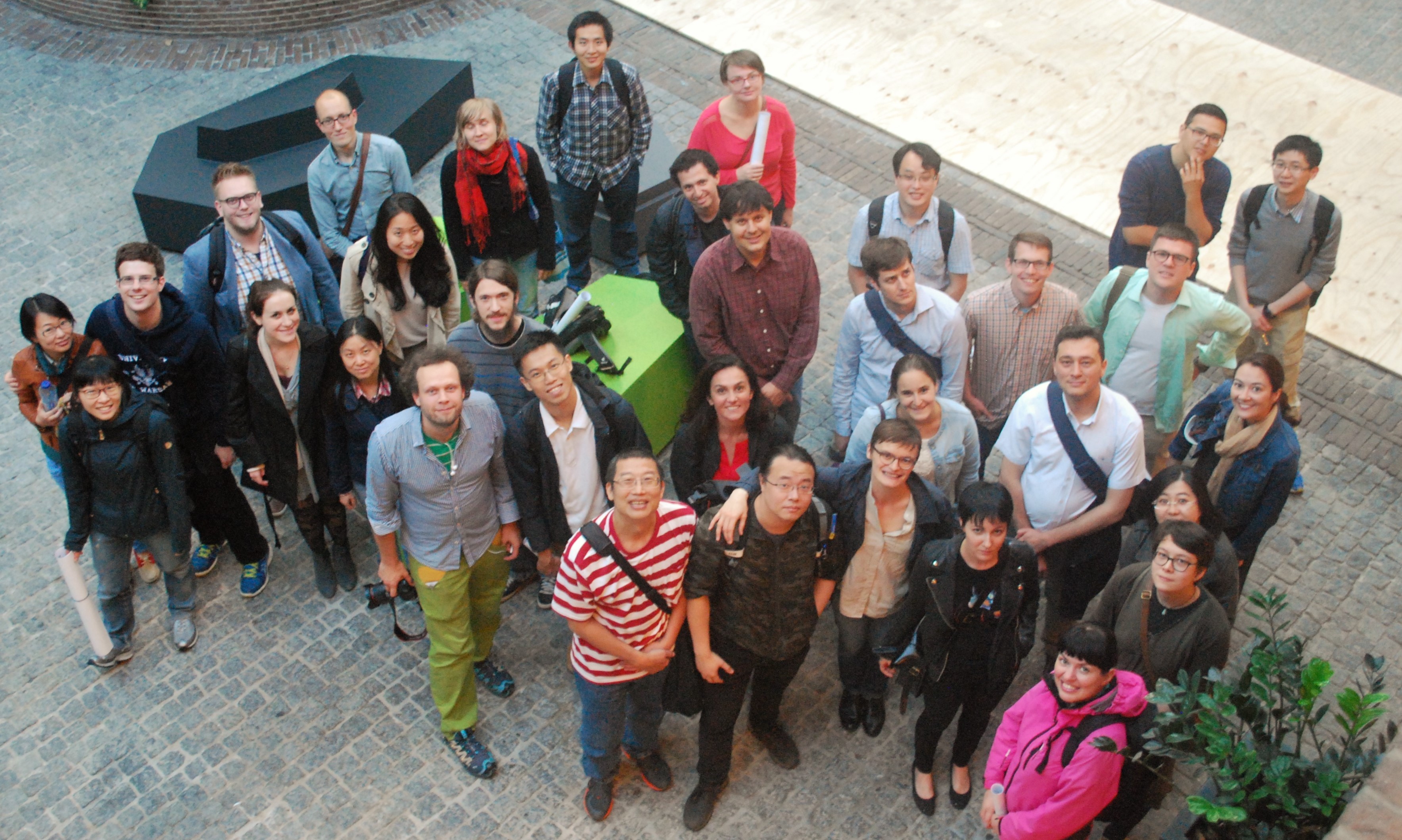
Acknowledgments
The Summer School in Chinese Digital Humanities, 2016 was sponsored by Chiang Ching-kuo Foundation for International Scholarly Exchange.
Recent blog posts
International Medieval Congress 2015 by mchu, July 30, 2015, 3:11 p.m.
Team members Hilde De Weerdt, Chu Mingkin and Julius Morche contributed to the panel “Historical Knowledge Networks in Global Perspective” ......read more
MARKUS update and new tools by hweerdt, March 12, 2015, 6:38 a.m.
The MARKUS tagging and reading platform has gone through a major update. New features are ......read more
Away day for the "State and society network" at LIAS by mchu, Dec. 5, 2014, 12:40 p.m.
Team members Hilde De Weerdt, Julius Morche and Chu Ming-kin participated in the Away Day of the “state and society ......read more
See all blog posts
 Recent Tweets
Recent Tweets
-
 @Hilde De Weerdt
1193 copy of al-Istakhrı's 10th C world #map, a maritime view of Afro-Eurasia as a world connected by seas--annotat… https://t.co/mZlZSIC0C41 year, 7 months ago
@Hilde De Weerdt
1193 copy of al-Istakhrı's 10th C world #map, a maritime view of Afro-Eurasia as a world connected by seas--annotat… https://t.co/mZlZSIC0C41 year, 7 months ago -
 @Monica H Green
A reminder that all the essays in the 2014 volume, *Pandemic Disease in the Medieval World: Rethinking the Black De… https://t.co/RntQ3Gw0On1 year, 7 months ago
@Monica H Green
A reminder that all the essays in the 2014 volume, *Pandemic Disease in the Medieval World: Rethinking the Black De… https://t.co/RntQ3Gw0On1 year, 7 months ago -
 @Journal for the History of
Knowledge
We are pleased to announce the theme of the new @jhokjournal special issue: 'Histories of Ignorance', with guest ed… https://t.co/5RRYoEsxoe1 year, 7 months ago
@Journal for the History of
Knowledge
We are pleased to announce the theme of the new @jhokjournal special issue: 'Histories of Ignorance', with guest ed… https://t.co/5RRYoEsxoe1 year, 7 months ago -
 @Hilde De Weerdt
CFP: Between Asia and Europe: Whither Comparative Cultural Studies? University of Ljubljana, May 2020 https://t.co/eyaWwNprEd1 year, 8 months ago
@Hilde De Weerdt
CFP: Between Asia and Europe: Whither Comparative Cultural Studies? University of Ljubljana, May 2020 https://t.co/eyaWwNprEd1 year, 8 months ago -
 @Craig Clunas 柯律格
Honoured to join the editorial board of "The Court Historian" as an index of the journal's wish to publish more stu… https://t.co/dgxW1hIYQ41 year, 8 months ago
@Craig Clunas 柯律格
Honoured to join the editorial board of "The Court Historian" as an index of the journal's wish to publish more stu… https://t.co/dgxW1hIYQ41 year, 8 months ago -
 @Global History of Empires
"And yet there is so much more to African history than stale narratives of slavery and colonialism." https://t.co/F8M0KTgIsL1 year, 8 months ago
@Global History of Empires
"And yet there is so much more to African history than stale narratives of slavery and colonialism." https://t.co/F8M0KTgIsL1 year, 8 months ago
